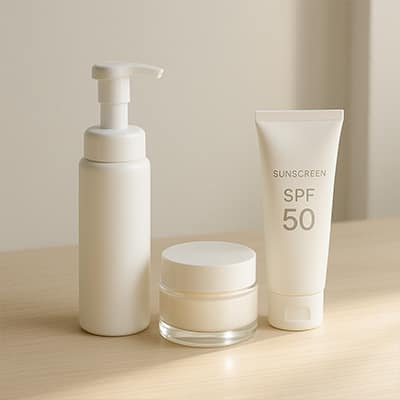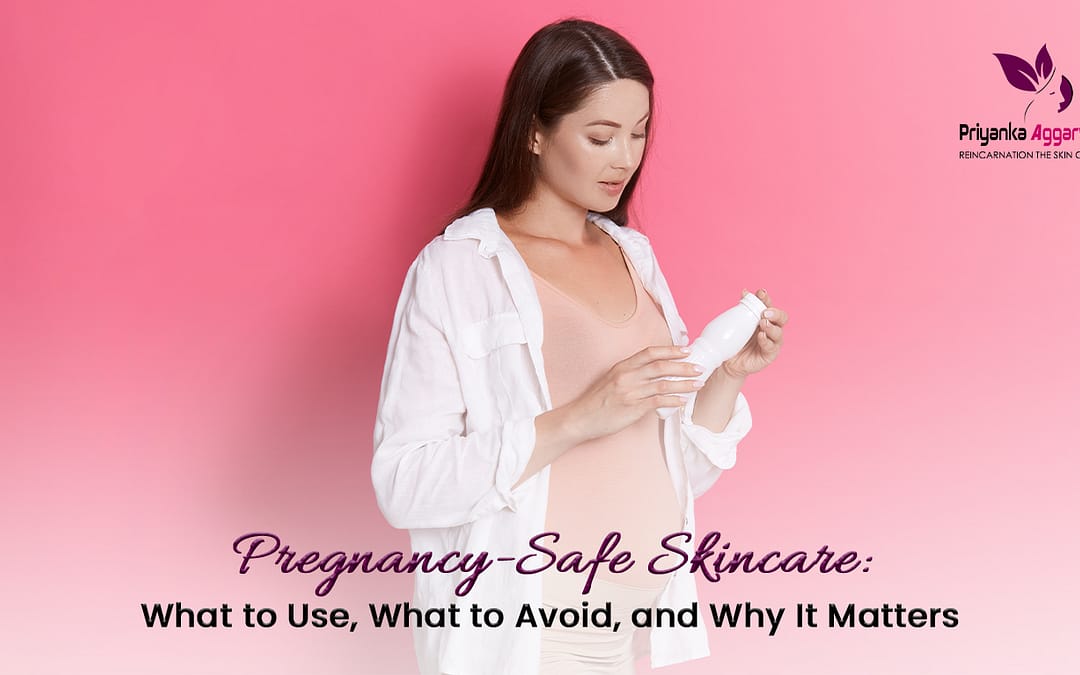When you get pregnant, pregnancy-safe skincare should be your first priority. You should know that pregnancy brings about a host of changes in your body, and your skin is not at all an exception. As hormones fluctuate a lot during this period, many women experience unexpected skin issues that are new to them, like acne, hyperpigmentation, dryness, and increased sensitivity. While you see these symptoms, it becomes necessary for you to tackle and manage these changes, but it also becomes essential for you to ensure that your skincare routine supports your health and your baby’s well-being. For your health and baby’s well-being, pregnancy-safe skincare is not only about what works but also about what’s safe for you.
In this blog, we will provide you with a comprehensive guide to help you make informed choices about skincare during pregnancy.
Table of Contents
Do you use Pregnancy-safe Skincare?
Most women don’t think twice about their skincare products until they are expecting. So, in case you don’t know, many common skincare ingredients can get absorbed into the bloodstream, which can potentially affect the developing foetus in your womb. Some of these ingredients, like retinoids, certain essential oils, and high doses of salicylic acid, have been linked to birth defects. These health issues in babies occur when any product with these ingredients is used in high concentrations or over extended periods. For any of you or any pregnant women, it is crucial to assess whether your current products are compatible with a pregnancy-safe skincare regimen.

Why Do You Need to Reassess Your Skincare During Pregnancy?
Reassessing your skincare during pregnancy is very important, as hormonal changes during pregnancy can increase the risk of skin sensitivity and allergic reactions. Additionally, there are certain skincare ingredients like retinoids, certain essential oils, and salicylic acid that are harmless under normal conditions, but they can pose some risks during pregnancy. If you reassess your routine, then it can prevent complications and provide peace of mind. It also allows you to adapt your skincare to tackle pregnancy-specific concerns such as melasma (also known as the “mask of pregnancy”), stretch marks, and hormonal acne.
Before and After Skincare in Pregnancy
This is something which everyone should know about because knowing this can reduce the chances of having a negative effect from routine during the pregnancy.
Before Pregnancy:
Most skincare routines involve products aimed at anti-ageing, acne control, or skin brightening. Ingredients like retinoids, salicylic acid, and hydroquinone are commonly used. These are effective but not always safe during pregnancy.
During Pregnancy:
Skincare during pregnancy should prioritize gentle, nourishing, and safe ingredients. Switch to mild cleansers, fragrance-free moisturizers, and products containing pregnancy-safe actives like vitamin C, niacinamide, and hyaluronic acid. Use mineral-based sunscreens containing zinc oxide or titanium dioxide to protect your skin without risking harmful chemical absorption.
Natural Remedies for Pregnancy Skincare
Many pregnant women prefer natural alternatives to avoid chemical exposure. We have listed some effective natural remedies for you to follow to have pregnancy-safe skincare. The remedies include:
- Aloe Vera Gel: Soothes irritated or itchy skin and reduces inflammation.
- Coconut Oil: Moisturizes and can help with stretch mark prevention.
- Oatmeal Baths: Relieve dry, itchy skin and are safe for frequent use.
- Shea Butter: Rich in fatty acids and vitamins, it helps maintain skin elasticity.
- Rosehip Oil: Contains natural vitamins C and E, promoting skin regeneration and hydration.
While natural remedies are generally safe, it is advisable to perform patch tests and consult your healthcare provider, especially if you have a history of allergies.
Pregnancy-Safe Skincare Routine
Creating a pregnancy-safe skincare routine involves selecting products that are gentle, effective, and free of harmful ingredients. Here’s a step-by-step routine:
- Cleanser: Choose a mild, soap-free cleanser that does not strip your skin’s natural oils. Look for ingredients like glycerin or chamomile extract.
- Toner (optional): If you use toner, ensure it is alcohol-free and contains soothing ingredients like rose water or witch hazel.
- Serum: Opt for serums with vitamin C for brightening, hyaluronic acid for hydration, or niacinamide for calming irritated skin.
- Moisturizer: A rich, fragrance-free moisturizer can help maintain hydration and barrier function. Ingredients like ceramides, squalane, and shea butter are safe and beneficial.

5. Sunscreen: Daily use of sunscreen is vital. Select a mineral sunscreen with zinc oxide or titanium dioxide to provide broad-spectrum protection without chemical filters.
6. Night Care: Avoid retinol or strong acids. Use products containing peptides or niacinamide, or simply stick to your daytime moisturizer for overnight care.
Common Pregnancy Skin Problems and How to Treat Them Safely
1. Acne:
Hormonal acne is common, especially during the first trimester. Avoid salicylic acid in high concentrations and benzoyl peroxide over 2%. Use mild cleansers, tea tree oil (in small amounts), and topical azelaic acid for safe acne treatment.
2. Melasma:
Dark patches on the face can be treated with vitamin C, niacinamide, and mineral sunscreens. Avoid hydroquinone and chemical peels.
3. Stretch Marks:
Prevent and treat stretch marks with consistent moisturization. Ingredients like cocoa butter, vitamin E, and hyaluronic acid improve skin elasticity.
4. Dryness and Sensitivity:
Hormonal shifts can make skin dry and sensitive. Use hypoallergenic, fragrance-free products and avoid long, hot showers.
When to See a Dermatologist During Pregnancy
If you are facing skin issues, then you should know that not all skin conditions can be managed with over-the-counter or home remedies. If you experience severe acne, persistent rashes, or changes in moles or birthmarks, seek advice from a dermatologist. A dermatologist like Dr Priyanka Aggarwal can provide you with guidance on safe prescription treatments and can help you manage skin concerns effectively without compromising your pregnancy.
Conclusion
Pregnancy-safe skincare is about balancing effectiveness with safety. It involves making thoughtful choices, being aware of harmful ingredients, and embracing gentle, nourishing products. By tailoring your skincare routine during pregnancy, you can protect your skin and your baby while still addressing common skin concerns. When in doubt, consult a dermatologist or your obstetrician to ensure the safest and most beneficial care for your skin during this transformative phase.
Also read: Acne Treatment at Home: Natural Ways to Heal Your Skin
FAQ
What skincare ingredients are not safe during pregnancy?
Avoid retinoids (retinol, tretinoin), high-dose salicylic acid, benzoyl peroxide (above 2%), hydroquinone, and certain essential oils like rosemary or clary sage. Chemical sunscreens with oxybenzone or avobenzone should also be avoided.
Is it safe to use vitamin C on your face while pregnant?
Yes, vitamin C is considered safe during pregnancy. It is an antioxidant that helps brighten the skin, even out skin tone, and support collagen production.
Can I use natural oils while pregnant?
Yes, most natural oils like coconut oil, almond oil, and jojoba oil are safe for topical use. However, always patch-test first and avoid oils with strong fragrances or essential oils known to affect hormones.

